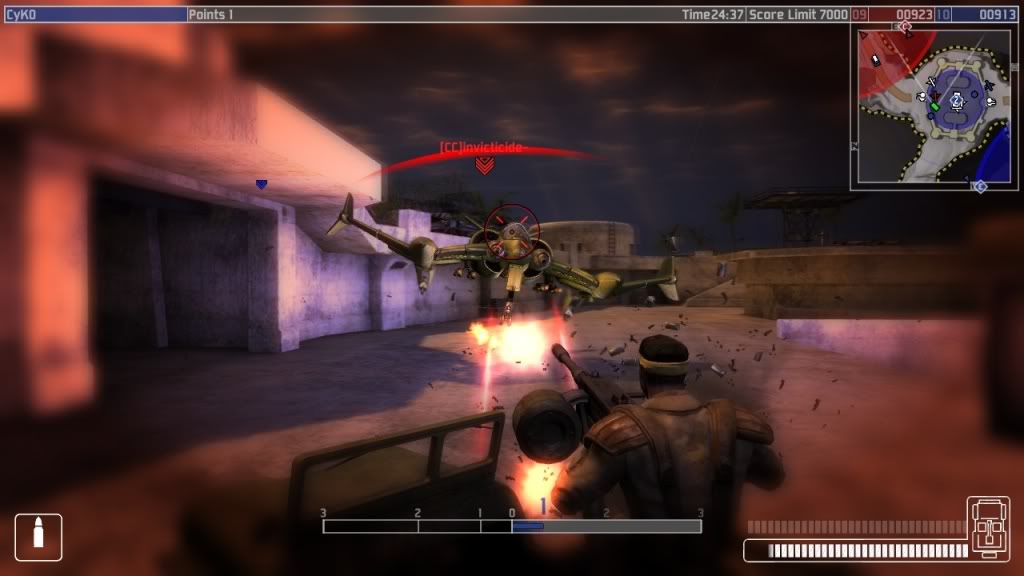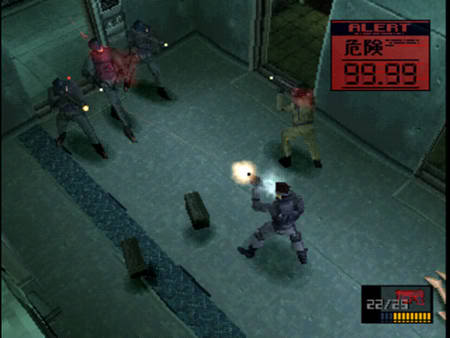This post has not been edited by the GamesBeat staff. Opinions by GamesBeat community writers do not necessarily reflect those of the staff.
Editor’s note: Alex considers the effect of music on gameplay, and suggests supplying your own soundtrack. Now where’d that Manowar CD go…. -Demian
Games are an amalgamation of multiple forms of media and experiences — and while I’m not a big fan of game reviewers who opt to break down their critique into component parts (story, presentation, graphics, sound, etc.), game music is what lit a fire under me today. I’m not necessarily talking about in-game music though — rather, the effect that music, either external or in-game, can have on the way we actually play games.
It started with Warhawk on the PlayStation 3. To those that are not in the know, Warhawk is a semi-sequel to a futuristic plane combat game for the PlayStation 1, and I say semi-sequel as it is more a re-imagining — partly because it’s missing a “II” or “The Revenge” in the title, and also because it’s a multiplayer-only online game.
Anyway, it’s fantastic, and has a rousing, orchestral soundtrack to keep you inspired as you tear through enemy ranks with a flamethrower. But I used the custom soundtrack option to listen to Led Zeppelin’s “Achilles Last Stand.” Not only is this my favorite song, but if you are in the mood to blow dudes up from a heavily armed vehicle it is a real boon.

Not strategically sound, but if you pull it off, it’s awesome!
To get to the point, I realized that I started to kick much more ass while listening to his highness Jimmy Page. I played like a man possessed; took more risks, chose different weapons, and threw teamwork to the wind as I ran screaming to the enemy flag in a burning jeep. While most people look at music to change their mood in a game, or add greater emotion to intense or moving scenes, I found that it was changing my actions. In this case, for the better.
To give another recent example, I was scanning through my Sega CD collection — I bought a great deal of games for the system all at one time, and I’m still working through playing them all. It’s a tough job, but I’m the only one in the apartment who is going to do it. Anyway, I decided to try out The Terminator, which is based on a property that is so hit-or-miss that there’s usually collateral damage.
Negatives: It’s so much better than Terminator Salvation that it’s kind of depressing.
Positives: It does not try to throw mazes at you like most games from the period, and the music is FUCKING AWESOME.
Do you guys want to know why the music is awesome? It was done by Tommy Tallarico, and if you have played Earthworm Jim you know that he is brilliant. You can sort of tell that he was reveling in the quality of CD sound — every level has its own track, and each one is a standout for the time period.

Kyle should probably start using all those grenades…
The problem is that in order to do well at Terminator, you have to be a little bit careful. Some enemies require you to duck under their fire and shoot back, others you need to jump over. Some require grenades to kill as opposed to bullets, and other enemies mean instant death if you touch them. Not so bad normally, but the music was so pumping and driving that I had trouble being careful and usually ended up dead. I should have played it cautiously, but instead I played it like Contra.
In the end, the music killed me. For the night club stage, Mr. Tallarico did a techno remix with a couple voice clips from the movie. “Not a robot *doodoot do doot doot* A cyborg *doodoot do doot doot*” Get the idea? I was laughing so much, and was so pushed ahead by the pumping music, that I lost all my continues.
Both of the games I have mentioned are relatively obscure titles — how about something more accessible? Let’s go back to the beginning (at least for most of you) with Super Mario Bros. for the NES.
When you play the original Super Mario Bros, do you ever jump in the air simply for the fun of it? Yeah, the jump mechanic is generally agreed to be perfect, the sound when Mario jumps is cathartic, but for me, I’m jumping around because the music is so damned joyful and peppy. I practically skip when the theme for the first level plays, as if to make Mario dance to the music by hopping through the levels.
On the other hand, when the castle music plays I tend to run more than jump. I play conservatively and quickly in order to survive the level, and that’s not just because those levels being more difficult. The music is quicker and more repetitive, making you feel like you are being chased; it’s downright nerve-wracking. Do I even have to mention the starman theme? It makes you feel like a six-year-old on a sugar rush. You’re invincible. not just because the game mechanics make you so, but because the music says so.

I am the reaper of souls!
What if, for some godforsaken reason, some of you have never played the original Super Mario Bros.? Well, I have a more recent touchstone, a crucial game in the evolution of the action genre.
Metal Gear?!
Yes, Metal Gear. Metal Gear Solid, to be exact. In 1998, this game not only had music that was above and beyond most titles at the time, it was orchestrated by a professional composer who had made his living doing music for Hollywood films, Henry Gregson Williams. Much like a film, most of the music in Metal Gear Solid was more ambient than commercial. It added a lot of personality and mood to the levels, but by and large was not meant to be very noticeable. This was important for the gameplay because it was a stealth-action game, duh.
Most of the music was rather low key, which made the player feel that they should probably move about carefully and break some necks rather than fire some guns. When you were inevitably spotted, however, the music changed to the popular, driving “Alert Phase” song that most of us know and love. A paranoid and quick-tempo beat mixed with alarms let you know, “Hey buddy, you should probably run and hide”. Your previous tactic of carefully moving from cover to cover is blown out of the water, and it starts to seem like a good idea to shoot up the place. They also take away your radar; but the whole time this frantic alarm music is pushing you to fight or flight, making it difficult to act strategically and forcing you to act in desperation.

Out of fight or flight, I chose the former.
We can all see how music affects our play simply by turning off the music in our games. When people get particularly freaked out playing a horror game, the first thing they will do is not cover their eyes (because they have to play, obviously) but turn the sound down or off. Playing Silent Hill without the loud industrial tracks from Akira Yamaoka does not make the game very scary, though much easier to play. Without that music you can think with the strategic part of your mind as opposed to the primal part, but then the game becomes rather dull.
I recommend that you try it. Turn down the in-game music and play your own tracks. Try Shadow of the Colossus without the rousing, orchestral score and shoot some Black Sabbath into your headphones. When you take down one of the colossi the normal music will make you feel more melancholy than victorious, but if you have the guitar solo from “Iron Man” playing you will feel like a goddam badass.
